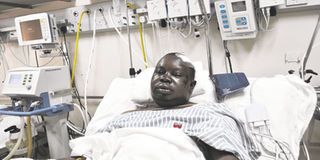Police reveal why they fail to catch kidnappers

Dr Steven Ulimboka at the Muhimbili Orthopaedic Institute after he was kidnapped and tortured in 2012. PHOTO | FILE
What you need to know:
It wasn’t clear where he got the information since the confessions of a believer before a bishop, priest or pastor are not supposed to be disclosed to a third party.
Dar es Salaam. The Police Force yesterday blamed the media for its failure to stem the wave of kidnappings and torture that has rocked the country in recent times.
Dar es Salaam Special Police Zone Commander Suleiman Kova told The Citizen police were working to solve a number of high-profile kidnap and torture cases, but added that “negative” reports by the media made it difficult to arrest the culprits.
On Tuesday, Tanzanians woke up to the news that the Chadema youth wing leader in Temeke District, Mr Joseph Yona, was kidnapped and badly beaten by unknown assailants the previous night. He was admitted to Muhimbili National Hospital and discharged on Tuesday.
Mr Kova said police were already questioning two people in connection with the attack. The incident brought back memories of the brutal assault two years ago on Dr Steven Ulimboka, who was the spokesman of doctors who went on strike in public hospitals in 2012, and last year’s attack on journalists Absalom Kibanda. Both were tortured and left for dead.
The two cases have yet to be solved, and police have been accused of dragging their feet in investigations. But Mr Kova said yesterday that “interference” by the media and other parties was hampering their efforts to catch up with the culprits
“When the media reports negatively or conclusively, police detectives end up not getting the public’s much-needed support and cooperation,” he said.
Mr Kova cited the case of Dr Ulimboka, saying when the victim named the alleged mastermind of his kidnap and torture, “conclusive” media reports brought police investigations to a virtual standstill after police lost the public’s trust. But he said there were positive results when the media heeded his call not to interfere in investigations launched after Constitutional Review Commission member Sengondo Mvungi was attacked and seriously wounded at home on November 3, last year.
“We arrested several suspects shortly after the incident. This is because there was no interference and we had the public’s trust,” Mr Kova said. Dr Mvungi died in a South African hospital on November 12, and 10 people have since been charged with his murder.
But it is the same Kova who announced to the media that police had arrested a Kenyan national, Mr Joshua Mulundi, in connection with the kidnapping and torture of Dr Ulimboka.
However, the Kisutu Resident Magistrate’s Court acquitted Mr Mulundi last year, and two years on, the billion-shilling question remains: who kidnapped and tortured Dr Ulimboka?
When Mr Kova announced that a suspect was in custody, police hardly looked like they had a watertight case against Mr Mulundi. There were loose ends dangling all over.
For instance, Mr Kova said the suspect confessed in church that he was involved in the kidnap and torture of Dr Ulimboka.
It wasn’t clear where he got the information since the confessions of a believer before a bishop, priest or pastor are not supposed to be disclosed to a third party.
How the media hampered investigations into the Dr Ulimboka case is also a subject of debate.
Police had swiftly appointed a probe team after Mr Kibanda was attacked on March 5, last year, but no breakthrough has been made almost a year after the incident.
Monday’s incident involving a Chadema cadre only serves to heighten concern over what is seen as an alarming trend and the police’s apparent inability or reluctance to deal with the problem.
Some analysts and human rights activists say the lack of progress in solving kidnap torture cases pointed to either a deliberate ploy to protect powerful individuals behind certain attacks or a system that is unable to function efficiently and effectively as far as crime investigation is concerned.
They say this fuels such incidents because the perpetrators know that they will not be caught and brought to justice.
The national coordinator of the Tanzania Human Rights Defenders Coalition, Mr Onesmo Olengurumwa, told The Citizen yesterday that impunity was a threat to peace. He said some degree of independence in law enforcement organs would help to stem the wave of kidnap and torture.
Mr Olengurumwa added that when such incidents happen, police do not rely on information provided by the victims, but rush to arrest people who had nothing to do with the crime to deflect attention, particularly when they establish that the perpetrators are within or close to the system.
Tanzanian Legal and Human Rights Centre Executive Director Helen Kijo-Bisimba said appointing probe teams even after the chief suspects were named by victims was a waste of time and resources. “The ability and integrity of the Police will remain questionable until it proves that it can effectively protect Tanzanians and their property,” she said.




